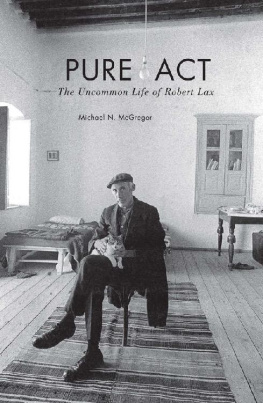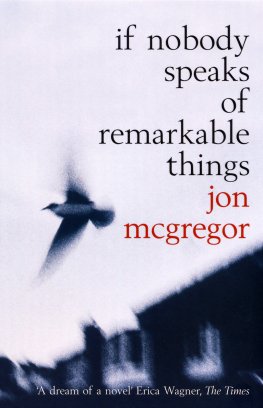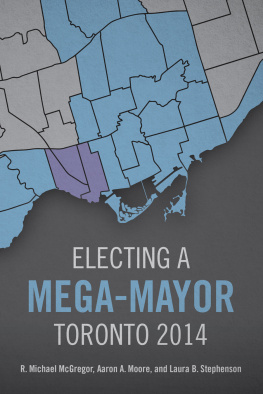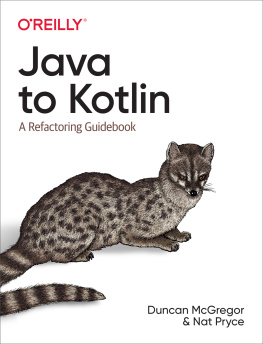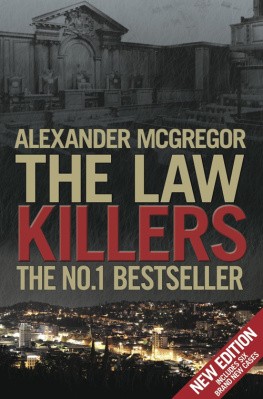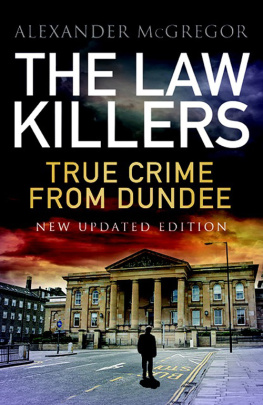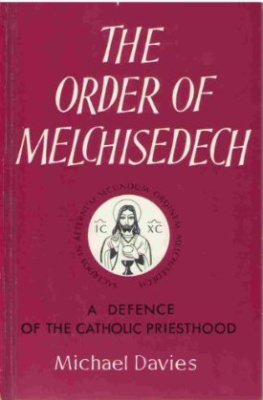Michael N. McGregor - Pure Act (Catholic Practice in North America)
Here you can read online Michael N. McGregor - Pure Act (Catholic Practice in North America) full text of the book (entire story) in english for free. Download pdf and epub, get meaning, cover and reviews about this ebook. year: 2015, publisher: Fordham University Press, genre: Detective and thriller. Description of the work, (preface) as well as reviews are available. Best literature library LitArk.com created for fans of good reading and offers a wide selection of genres:
Romance novel
Science fiction
Adventure
Detective
Science
History
Home and family
Prose
Art
Politics
Computer
Non-fiction
Religion
Business
Children
Humor
Choose a favorite category and find really read worthwhile books. Enjoy immersion in the world of imagination, feel the emotions of the characters or learn something new for yourself, make an fascinating discovery.
- Book:Pure Act (Catholic Practice in North America)
- Author:
- Publisher:Fordham University Press
- Genre:
- Year:2015
- Rating:5 / 5
- Favourites:Add to favourites
- Your mark:
- 100
- 1
- 2
- 3
- 4
- 5
Pure Act (Catholic Practice in North America): summary, description and annotation
We offer to read an annotation, description, summary or preface (depends on what the author of the book "Pure Act (Catholic Practice in North America)" wrote himself). If you haven't found the necessary information about the book — write in the comments, we will try to find it.
Pure Act (Catholic Practice in North America) — read online for free the complete book (whole text) full work
Below is the text of the book, divided by pages. System saving the place of the last page read, allows you to conveniently read the book "Pure Act (Catholic Practice in North America)" online for free, without having to search again every time where you left off. Put a bookmark, and you can go to the page where you finished reading at any time.
Font size:
Interval:
Bookmark:
Michael N. McGregor
Fordham University Press
New York 2015
Catholic Practice in North America | Angela Alaimo ODonnell and John C. Seitz, series editors
Copyright 2015 Michael N. McGregor
All rights reserved. No part of this publication may be reproduced, stored in a retrieval system, or transmitted in any form or by any meanselectronic, mechanical, photocopy, recording, or any otherexcept for brief quotations in printed reviews, without the prior permission of the publisher.
All quotations from Robert Laxs poetry and other writings are used by permission of the Robert Lax Literary Trust.
Excerpts from Seven Storey Mountain by Thomas Merton. Copyright 1948 by Houghton Mifflin Harcourt Publishing Company; copyright renewed 1976 by the Trustees of The Merton Legacy Trust. Reprinted by permission of Houghton Mifflin Harcourt Publishing Company. All rights reserved.
Quotations from Thomas Merton letters first published in When Prophecy Still Had a Voice are reprinted by permission of the Merton Legacy Trust.
Fordham University Press has no responsibility for the persistence or accuracy of URLs for external or third-party Internet websites referred to in this publication and does not guarantee that any content on such websites is, or will remain, accurate or appropriate.
Fordham University Press also publishes its books in a variety of electronic formats. Some content that appears in print may not be available in electronic books.
Visit us online at www.fordhampress.com.
Library of Congress Cataloging-in-Publication Data
McGregor, Michael N.
Pure act : the uncommon life of Robert Lax / Michael N. McGregor. First edition.
pages cm. (Catholic practice in North America)
Includes bibliographical references and index.
ISBN 978-0-8232-6801-6 (hardback)
1. Lax, Robert. 2. Poets, American20th centuryBiography. 3. PoetryAuthorship. I. Title.
PS3523.A972Z76 2015
811'.54dc23
[B]
2015009511
First edition
For Sylvia,
who is always there,
and in memory of Doris McGregor,
who always was
I think its a metaphysical concept
starting with Aristotle and flowering in St. Thomas
that God is pure act and that there is no potentia in Him.
... Almost everything else in the universe is in potentia,
its on its way to being pure act,
on its way to unity with God.
Robert Lax
Depending upon the reader, it is all either baffling or beatific.
American Library Association Booklist review of 33 Poems, the first Lax book issued by a major American publisher
Years had passed since my last visitsince he was aliveand I had no idea how Id feel. His niece had offered me his home, a humble whitewashed haven high above the islands harbor. Id been in it countless times but only once or twice alone, while he was shopping for his cats or strolling by the sea. Hed leave the key out in the lock when he was gone, inviting anyone who happened by to enter. Poised there by the frosted glass, it said that he had nothing to hide. Nothing worth stealing. Nothing he would keep from anyone, even his time. Hed moved to Patmos, called the Holy Isle, in part because people on the island he loved most, Kalymnos, suspected him of hiding things. Of stealing secrets. Of being a spy. Nothing could have hurt him more or been further from the truth. He loved them more than they would knowthe fishermen, the captains, the sponge divers. He had searched for them throughout his lifea society as pure and true as theirsand they meant more to him than anyone, except perhaps his circus family or the man whod been his closest friend, the monk and writer Thomas Merton.
It was Merton who had led me to him in the first place, painting such a vivid portrait of him in his autobiography that I wanted to meet him, not knowing he was living on the same Greek island I was as I read about him. Twenty years had passed since then, years of mentoring, of friendship, decline, then death. How would I feel, I wondered, when I saw the door without the key, the room without his bed, the walls without their quilt of postcards, quotes, and childrens drawings? Acquire the spirit of peace and a thousand souls shall be saved around you, one quote said. Had that spirit lingered there? Or had it died with him?
By the time I reached Kos, the nearest island with an airport, Id been traveling for thirty hours from my home in Oregon. Nowhere had I felt the joy I always felt when I returned. Was it only that he wasnt there? Or that Id stayed away too long? Or that my life had changed too muchthat I was married now, a tenured professor, closer to his age the day we met than to my own back then? As I set my bags down on the hydrofoils floor for the four-hour crossing to Patmos, I felt weary, wondering why Id traveled all that distance, what I hoped to find. I looked out at the stillness of the sea, the bright Greek light I knew from all those mornings all those years ago, and like a swell of sunlit waves, it all came back: the joy and peace of all those visits, all those talks, all those days I climbed those whitewashed stairs and knocked against that glass, waiting with the sightless cats to hear his tender Yes?
It felt like cheating then to take the shorter hydrofoil route, the easy flight from Athens. The ferry ride once seemed the only way to reach his island, a nine-hour journey from the modern world back into the stark simplicity of Patmos. Id sit out on a hard-backed bench to feel the sun or press myself against a wall to keep the wind from whistling through me, and when the day had hardened into night, Id stare into the black ahead until I saw the lights of Chora floating like the orbs of some celestial city, high above whatever cares Id brought along.
Have I grown soft, I wondered as the engines thrummed, accepting comfort in a way he never did? Then the hydrofoil was shooting forward, shuddering on its slender shafts, and I was flying like a bird toward Patmos, winging toward that land we call the past. If only he could be there on the dock, I thought. If only we could climb the stairs together. If only I could go back to that day I read about him, unaware that he was living steps away.
Id gone to Europe that year, 1985, because I had questions. Huge questions. Seemingly unanswerable questions. They were questions about how to live in a world full of pain and violence and need. A world in which few people seemed to think about the way they lived and its effect on others. For the past three years Id been writing about poverty, oppression, and illness in the worlds poorest countries. Id interviewed subsistence farmers in remote areas of Bangladesh, Khmer Rouge refugees on the borders of Cambodia, and children in Nepal and India crippled by diseases long eradicated from developed nations. In a camp surrounded by barb-wire, Id listened to a beautiful Vietnamese refugee describe repeated rapes by Thai pirates. I didnt know what to do with her tears, or with the endless lines of homeless people on Calcuttas streets, or with the orphan girl who took my hand and squeezed it tightly in Thailand, as if a touch could make up for the sight shed lost to disease.
From reading everything I could about the causes of entrenched poverty and how the Third World came to be, Id learned that people werent poor because disease or drought alone had devastated them or because they had too many children. They were poor because history had made them poor or kept them poor while others grew rich. They were poor because the world was arranged the way it was, with structures in place that kept the wealthy nations wealthy. America was part of the problem, but so was Europe. Most of the history I read, in fact, was a history of European occupation, European extraction of natural resources, European imposition of cash-crop farming and enslavement or virtual enslavement of native populations.
Font size:
Interval:
Bookmark:
Similar books «Pure Act (Catholic Practice in North America)»
Look at similar books to Pure Act (Catholic Practice in North America). We have selected literature similar in name and meaning in the hope of providing readers with more options to find new, interesting, not yet read works.
Discussion, reviews of the book Pure Act (Catholic Practice in North America) and just readers' own opinions. Leave your comments, write what you think about the work, its meaning or the main characters. Specify what exactly you liked and what you didn't like, and why you think so.

